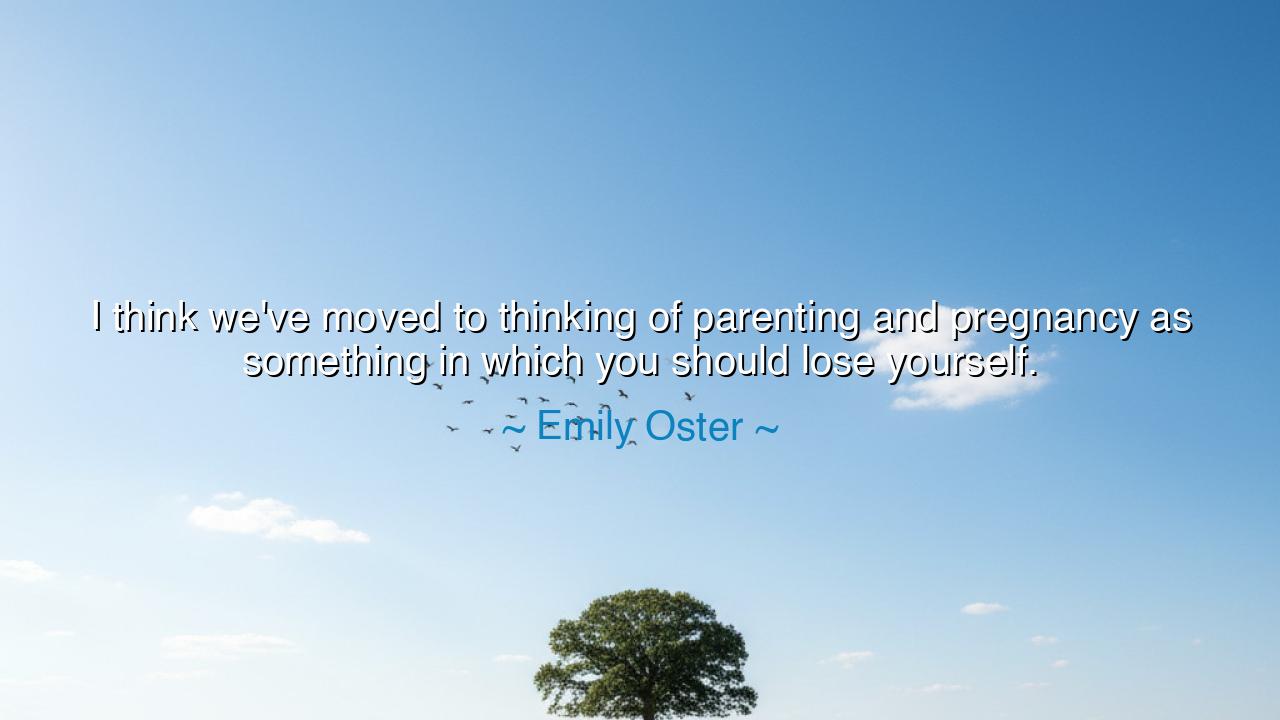
I think we've moved to thinking of parenting and pregnancy as
I think we've moved to thinking of parenting and pregnancy as something in which you should lose yourself.






Hear the words of Emily Oster, who speaks with the clarity of one who has seen the illusions that society builds: “I think we’ve moved to thinking of parenting and pregnancy as something in which you should lose yourself.” In this reflection, she reveals a truth about modern life—that the sacred work of parenting and the journey of pregnancy have been transformed, not into paths of balance, but into demands for total sacrifice. The world whispers to parents, especially to mothers, that to be worthy, they must erase themselves, surrender all identity, and dissolve entirely into the lives of their children. Oster’s warning is not against love, but against a culture that mistakes obliteration for devotion.
In ages past, parenting was understood as one part of life’s great tapestry. Parents worked, prayed, loved, and raised children while still belonging to their communities, their crafts, and themselves. The mother was not expected to vanish into motherhood, nor the father to dissolve into fatherhood. Both roles carried weight, but they were lived alongside other duties and joys. Today, however, society has raised an impossible ideal of self-erasure, where parents are told that to give anything to themselves is selfish, and to live beyond their children is betrayal. Oster unmasks this ideal as dangerous, for in losing themselves, parents risk giving their children not love, but emptiness.
Consider the story of Medea in Greek tragedy. She gave all of herself to her husband Jason, abandoning her family and her land to follow him, pouring her whole being into his cause and their children. Yet when betrayal came, when her selfhood had been dissolved into another, she was left with nothing but despair and rage, and in her ruin, her children suffered. Though extreme, her tale mirrors Oster’s wisdom: when one is told to lose oneself entirely in devotion, destruction can follow, for no love can flourish when it grows out of self-erasure rather than strength.
The heart of Oster’s words is the reminder that parenting is not martyrdom, but balance. A parent who has no self left cannot teach a child resilience, joy, or independence. A mother who forgets her own needs teaches her children that women exist only to serve. A father who buries his identity in sacrifice may raise children who believe love is a weight rather than a light. Children do not need parents who vanish—they need parents who live fully, showing them by example that love is not about destruction of the self, but about wholeness, generosity, and shared humanity.
This is why Oster speaks with urgency: the cultural shift toward losing oneself is no badge of honor—it is a burden that breeds unhappiness. Parents who are told to surrender every piece of themselves may feel guilty for wanting rest, friendship, or ambition. They may believe that anything less than total sacrifice is failure. But in truth, what nourishes children most is not a parent who disappears, but a parent who is present, alive, whole, and joyful. In this balance, children learn both how to give and how to live.
The lesson, then, is clear: do not lose yourself in parenting—find yourself within it. Love your children with devotion, but also honor your own soul. Read, create, work, rest, and live as a full human being, so that your children may see the model of a life well-lived. This is not selfishness; it is wisdom. For children raised by parents who know themselves learn that love does not demand erasure—it demands strength, compassion, and authenticity.
Therefore, let all who hear these words take action: resist the lie that you must vanish into parenthood. Instead, nurture both your children and yourself. Create homes where joy flows not from endless sacrifice, but from shared love, where parents stand not as shadows of themselves, but as whole beings guiding their children into wholeness. In doing so, you not only preserve your own spirit—you give your children the priceless gift of a parent who is alive, present, and real.
Thus Emily Oster’s words, though spoken with simplicity, carry ancient wisdom: parenting and pregnancy are not meant to consume the self, but to expand it. And when parents remember this truth, they will not only raise children—they will raise them in homes filled with balance, strength, and enduring love.






AAdministratorAdministrator
Welcome, honored guests. Please leave a comment, we will respond soon